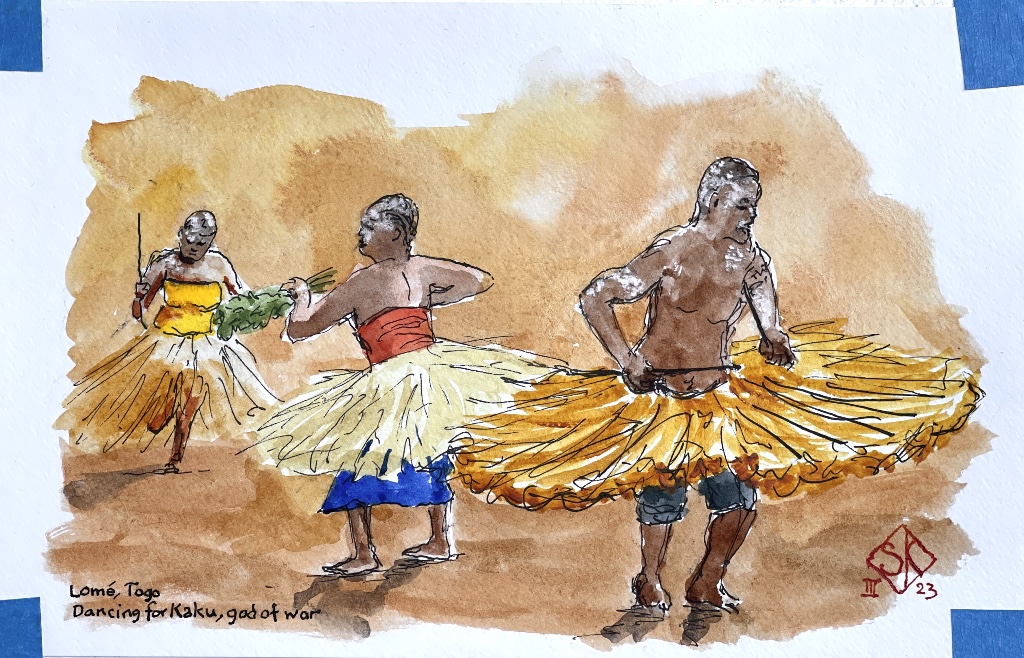DAY 69 Saturday, March 24. Lomé, Togo
I’d like to begin with an aside: We were made aware by one of our local guides that ours was the first cruise ship to visit this area of Africa in more than three years. Well, considering the global effect of COVID19, I guess I shouldn’t have been surprised. Then of course Mary pointed out that the last cruise ship to be attacked (unsuccessfully) by pirates was in 2019 . . . so we’re just the next ship that has sailed through these parts!
In a previous installment I included a number of sketches of the people of the city of Abidjan, the Ivory Coast. The way they were dressed they would fit right in with any large American city. They would not turn heads. In fact I did do a double-take at one point. I thought I saw my old accountant from New York on the street.
The same is true for Lomé. To differentiate themselves, for easy identification, our guides were dressed in identical African print shirts and dresses. But their normal clothes were Western, actually more American, I think, than European. The same stuff we buy at home.
THE SECRETS OF VOODOO
For Lomé we signed up for a sensational-sounding tour that would take us to a Voodoo ceremony. The popular notion of Voodoo is all zombies, shrunken heads and pincushion dolls. I knew the tour wasn’t going to be about that, but I wasn’t quite sure what to expect. Voodoo is simply the word the guides use to describe the local religion, though its local names are different. So the ceremony we went to see turned out to be simply an ordinary event in the lives of the people here. Not at all special, like the parade and dancing we saw in Dakar. Just a part of daily life.
Our guides described Voodoo as a part of the belief system of their families, their tradition. They may be Catholic, for example, but Voodoo may be part of their lives, as well. They may go to church one day, we’re told, and then take part in a ceremony like this one on another day. This is similar to the Buddhists of Myanmar, I think. They follow Buddhism, but for example when they want to open a new business, or build a house—anything major—they make offerings to spirits of the dead, which they fear may become jealous and upset their plans.
The Tour
In the afternoon three large buses filled with us passengers set off for a suburb of Lomé. We went down the main highway, the one that led to Ghana, and turned off onto a part of town with few paved streets. Soon we were in an unpaved area. Not streets exactly, just an orange, sandy ground, with lots of big puddles from last night’s rain. This was actually kind of iffy for these big buses but they bumped along without getting stuck.
They parked in an open area near a large, but undistinguished building, carefully letting us off on dry ground. We were led to the other side of the building where there was an open square lined on two sides with benches for us to sit on. A line of blue Adirondack chairs was set up along the building’s porch, for the group’s elders; a group of drummers on the opposite side, along with a group of men. The drummers were already going, putting down a catchy but conservative beat. No cowbells or police whistles, for example. The group of men were lead by the man in the middle in call-and-response singing that you read about in all the books.

A few people, both men and women, anointed themselves with a white powder, put on a large grass skirt over their clothes, and began to dance in the square. They proceeded to put themselves in a trance-like state by spinning and dancing in a vigorous way. One woman actually passed out and was brought inside the building. We were told the leader would sit with a person in this state to talk them down. If necessary they would take them into a particularly sacred room, which had sacred symbols and figures—the “dolls” we’ve all hear of, which would help the person calm down.
At the end of about an hour of watching this the tour guides rounded us up and we quietly left for the buses. No fuss, no leave taking. The ceremony carried on with not interruption.
When we returned I overheard someone ask if any of us were invited to dance with them. This struck me as a very strange question. Imagine you are an average American, a Protestant of one kind or another, living in an average, small town. A literal boatload of Chinese tourists come to town and they all crowd in to your church. They don’t speak or understand any English. They take out their phones and start snapping pictures. Do you invite them to pray along with you? sing the hymns?
Still I wonder what other people got from this experience. Did they see what I saw? Did it increase their understanding or appreciation of this different, yet not so very different culture?
